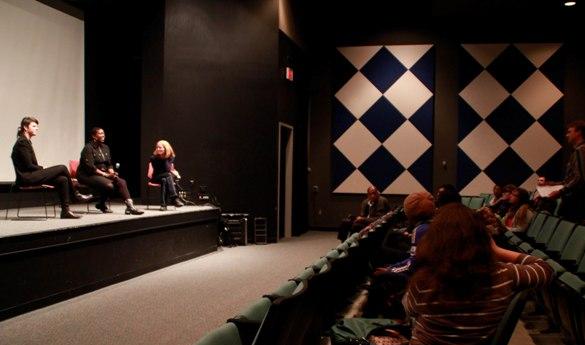The New Black shares a new perspective on homophobia
Many student organizations within the Mason community teamed up to present a new film exposing the dangers of homophobia at the JC Cinema.
Some students are unaware of the ongoing homophobia within some black communities in Maryland that surfaced after the election of 2008 when President Barack Obama was first elected and Proposition 8—a proposition to outlaw gay marriage—passed in California.
“Soon after the election, African Americans were blamed for the loss of marriage equality. I was kind of shocked and confused as to why black people and gay people were being pinned against each other in this way and why the voices of black LGBT folks were completely left out of the gate. That’s what started me on this journey into this issue,” said filmmaker Yoruba Richen, who responded to this turn within this community to direct a documentary called, “The New Black.”
“The New Black” tells the story of how the African American community is coping with gay rights in response to Proposition 8 in California and Question 6 in Maryland.
“'The New Black' takes up an issue that is at once local and much more broad. We selected ”The New Black” because of its local subject matter, the ongoing newsworthiness of its subject matters, including marriage equality's changing status across the US, black community activism and the visibility of LGBT individuals and communities,” said Cynthia Fuchs, director of Film and Media Studies.
Student organizations involved with this film-viewing include African and African American Studies, Cultural Studies, English, Film and Video Studies, the Honors College, the LGBTQ Resources Program, Sociology and Anthropology, University Life and Women and Gender Studies.
While the film does focus on the gay marriage battle between the black church and black LGBT individuals, the issues extend beyond marriage equality.
“The themes are bigger than just gay marriage and have more to do with issues of acceptance and family and the intersection of race and sexuality and politically the fight in marriage,” Richen said.
Students had strong reactions to the film. Many were curious about the structure, the importance of showing the church in black communities, where the lead characters are now and the discussions about civil rights.
The film left an impact on some of the students that attended the viewing, including senior Integrative Studies major, Delal Salah.
“It was an eye-opening experience just seeing how the effect of the church on the African American community was so overwhelming and how it was used, from what I understood, as a marketing tool to get African Americans to be stigmatized,” Salah said. “I never knew this was going on and after this film, it really raised a lot of questions for me. It left me hopeful because after the election in the state of Virginia, we now have a governor who claims to be pro equality. This film was very influential and very uplifting but at the same time, very deep.”
This is not just a local issue or a film about gay rights. It is about standing up for what you believe in and not backing down when times get hard.
“I think it’s important that students see this film because it’s really about [the students'] fight. I think it’s confirmed when you talk to people anecdotally that young people are the ones who are leading the way on the gay rights issue and they’re the ones who are making change,” Richen said. “I think the film shows these young activists and the work that they are doing. It’s inspiring for the students who are interested in this issue or any kind of activism. Ultimately it is a story about activism: the personal side and the political side.”

